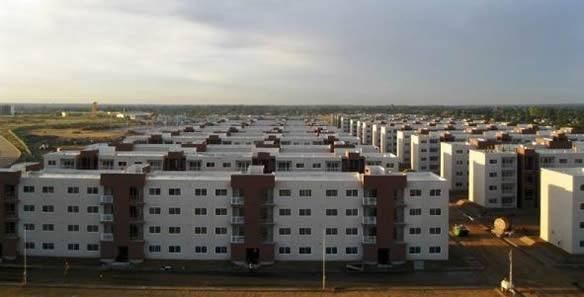Mozambique wants to resize existing conservation areas to ensure balance with communities
A home of your own: Access to funding continues to be the main barrier in Mozambique

O País
Representative of UN-Habitat says that about 80 percent of the Mozambican population lifts in informal dwelling and in places prone to natural disasters
The United Nations Human Settlements Program (UN-Habitat) considers that access to adequate housing outside risk areas is still a major problem for a large part of the Mozambican population. According to the UN-Habitat representative in Mozambique, Joost Mohlmann, about 80 percent of the population resides in informal settlements, often in places prone to natural disasters.
Among the factors that hinder house-buying are cost and the lack of credit. “Housing in Mozambique is very expensive,” Mohlmann says. “The big problem in Mozambique is that there isn’t a strong real estate market, there are no mortgages, and there is little microcredit.”
According to UN-Habitat, those living in cities need to earn six to eight times the average salary in order to gain access to funding, and even this system is not accessible to the entire population. “I think that access to housing should be improved gradually. Financial institutions should be more open to financing loans for building or buying houses,” Mohlman suggests.
Mohlmann was speaking at a World Habitat Day event on Saturday which saw he presentation of the Mozambique National Report for the Global Habitat III Conference. The report, by Albino Mazembe, says that housing has not been a priority for African governments, particularly Mozambique.
“In Africa, urban issues are not paramount. There are other agendas, such as poverty, industrial development and agrarian development, so urban housing issues are relegated to the background. For lower-income social strata, housing has been a problem they must solve on their own. There are few forces, either in the private sector or civil society, that intervene in this field,” Mazembe says.
The report also points to weaknesses in public housing policies. “The country has been in the process of developing strategies which are often not backed up by specific programmes that can ensure widespread roll-out. Although specific policies for housing development have existed since national independence, they find no basis in urban growth in general,” Mazembe says.
Mazembe draws attention to the fact that policies and strategies are developed at the central level, whereas, in his view, they should be decentralised and implemented by the municipalities, because they are better aware of the territory and population to be housed in these spaces.
The author of the report also says that movement from the countryside to the cities has increased rapidly, but the government’s response to land-use planning has been slow.
“The government, at both the central and local levels, has not had the answer or the necessary time to prepare for this invasion of people from the countryside. So what is available in most cases is either insufficient or incomplete, and this causes our cities to accumulate informal settlements, because people live in cities lacking basic conditions and without the conditions conducive to social well-being,” Mazembe concludes.
UN-Habitat is working with the Ministry of Public Works, Housing and Water Resources to devise and publicise ways to make housing more resilient to natural disasters and to create a new housing policy. The current policy has been in effect since 2011.
World Habitat Day was established in 1985 by the United Nations General Assembly as an occasion for people and governments to reflect on the state of cities and the basic right to adequate housing. The day also calls attention to the responsibility that all stakeholders have to shape the urban future in a conscious and economically viable way for all. This year’s World Habitat Day concentrated on the theme “Housing Policies: Affordable Housing”.











Leave a Reply
Be the First to Comment!
You must be logged in to post a comment.
You must be logged in to post a comment.